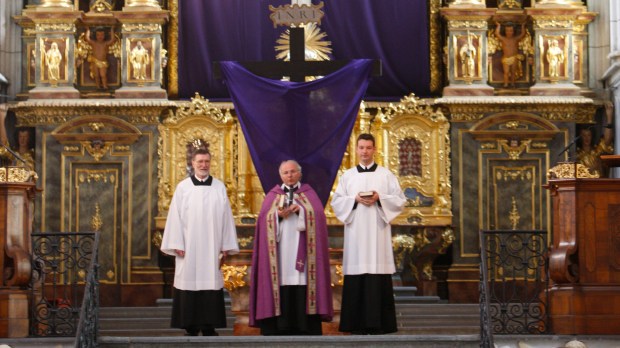The season of Lent is a rich and beautiful time of the liturgical year, and as the Church looks forward to the joys of Easter, she calls the final week of Lent by a variety of different names to bring out rich themes of meditation. While most call this week “Holy Week,” it is also called by at least four other names.
1Holy Week
One of the most enduring names for this week is, “Holy Week.” Simply put, this is a reference to the holiness of the mysteries celebrated during this week, and reflects another ancient tradition of calling each day of the week Holy, such as Holy Monday, Holy Tuesday, Holy Wednesday, and Holy Thursday.
It is the holiest week of the Church’s liturgical year.
2Great Week
Many Eastern Christians call this week, “Great Week,” which reflects another ancient tradition, explained by St. John Chrysostom in one of his homilies.
We call the week great, not because it has a greater number of hours – other weeks having many more hours, after all – not because it has more days, there being the same number of days in this and the other weeks, of course. So why do we call this week great?Because in it many ineffable good things come our way: in it protracted war is concluded, death is eliminated, curses are lifted, the devil’s tyranny is relaxed, his pomps are despoiled, the reconciliation of God and man is achieved, heaven is made accessible, human beings are brought to resemble angels, those things which were at odds are united, the wall is laid low, the bar is removed, the God of peace having brought peace to things on high and things on earth. This, then, is the reason we call the week great, because in it the Lord lavished on us such a plethora of gifts.
3Painful Week
One of the lesser known names for this week is, “Painful Week,” which is not a very popular name for this week of Lent, but reflects the intense pain felt by Jesus, as well as the Church as she watches her savior suffer and die.
4Week of Indulgences
Another curious name for this week is the “Week of Indulgences,” which reflects a former tradition of welcoming back the penitents, who at the beginning of Lent were barred from the Church. With their penance now completed, the Church opens the doors back-up to them and welcomes them into the flock.
5Week of the Bridegroom
Another Eastern Christian name for this week is the, “Week of the Bridegroom.” This primarily refers to the first three days of Holy Week, where in the Byzantine tradition the liturgy recites the following words:
Behold, the Bridegroom is coming in the middle of the night.
Blessed is the servant He shall find awake.
But the one He shall find neglectful is not worthy of Him,
Beware, therefore, O my soul! Do not fall into a deep slumber,
lest you be delivered to death and the door of the Kingdom be closed to you.
Watch, instead, and cry out:
Holy, holy, holy are You, O God.
Through the intercession of the Theotokos, have mercy on us.I see your bridal chamber completely engulfed with light, O my Savior,
and I do not have a wedding garment to enter and enjoy your brightness;
fill the garment of my soul with light,
and save me, O Lord, save me.
Jesus himself spoke of the events of Holy Week in these terms, recalling how, “the days will come when the bridegroom is taken away from them, and then they will fast on that day” (Mark 2:20).


